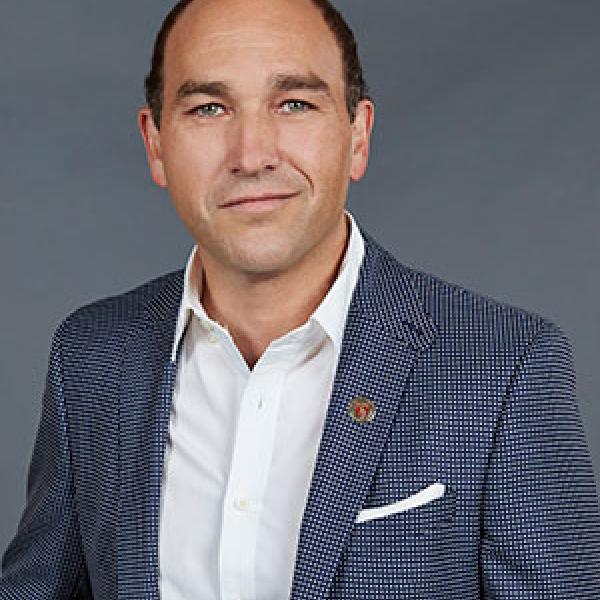
Alumni of Distinction
Daniel Popowich
Daniel Popowich, a Mohawk professor in the Humanities and Social Sciences department was the recipient of a Mohawk Award of Excellence in 2014 for his development of numerous courses and his creative approach to teaching within the blended educational framework. He was responsible for developing short promotional videos for a variety of courses from Forensic Anthropology to Environmental Sustainability to Human Sexuality with the purpose of showing prospective students what to expect from this course. His dedication to supporting Mohawk students is evident through his innovative approach to teaching and by his support of student bursaries.
Daniel has authored two textbooks, Disease, Health, Healing and History (2013; 2015) and It's in the Bones: Evidence of the Past (2013). He holds a Master’s Degree in Anthropology from the University of Manitoba and a Bachelor of Arts in Anthropology and Philosophy from McMaster University. His experience and insight has made him a sought-after reviewer for a number of textbooks and book proposals in areas of sociology and anthropology in Canada.
If you could go back in time, what 1 piece of advice would you give to yourself on the first day of College?
This is a difficult question because one does not want to tinker with the time-space continuum, at least according to Dr. Brown from Back to the Future. Nevertheless, while I wouldn’t want to change anything about my experiences at Mohawk or the choices I made, I would like to reassure myself that I was on the right track: enrolling in the General Arts and Science program was a great investment. As a professor who teaches in the program that I graduated from, I encounter students who remind me of myself, in one way or another, every semester. Fortunately, I have the opportunity to reach out and assure them that whether or not they pursue a future in a General Arts and Science related subject or move on to another area of study, they have made the right decision: they are finding their pathway. There is no question about it: post-secondary education provides one with the opportunity to pursue one’s interests or even “craft” a new identity based upon newfound interests.
How has your education at Mohawk prepared and supported you throughout your career?
When I first attended university, after graduating from Mohawk College, I found that my college education gave me an edge over other students and prepared me for the years of post-secondary education that followed. Not only had I gained a strong foundation in the Liberal Arts, but also, my experiences at Mohawk empowered me and helped build the confidence I needed to complete my undergraduate and graduate studies. As for my Mohawk education and my career, my experiences at the College – as a student – provided the “gold-standard” by which I teach. For example, my professors were dedicated educators who always “went the distance” for their students. They offered encouragement, constructive criticism, and laid a solid foundation in the areas they taught. With that said, my education at Mohawk prepared me for my career by setting many of the examples and pedagogies I use today. In the end, I am simply following a model of teaching that I respected. Of course, I’ve got a little creative along the way and added my own insight. Last semester, for example, my Associate Dean asked me to create a video for the Board of Governors about the School of Interdisciplinary Studies and the various pathways that students take. While shooting, I connected with the students on so many levels. I wrote the phrase on a whiteboard and filmed it for the video. I think it really captures many of our experiences and the way Mohawk students feel about the College: “My pathway, my future, my Mohawk.”
If you could sit down and have a conversation with anyone, alive or dead, who would it be? Why?
If I could sit down with anyone – either dead or alive – it would have to be whoever was responsible for inventing and building the Great Pyramids in Egypt because I would know for sure whether humans or aliens built them. All joking aside, I would want to have a conversation with the father of American Anthropology – Franz Boas – because of the contributions he made to education, science, and political activism. Not only was Boas responsible for training the first generation of anthropologists single-handedly, and introducing the idea of culture and cultural relativism to the social sciences, but he was also responsible for challenging many of the racist ideas that existed in the late 1800s and early 1900s such as the theory of biological race and social evolution. At a time when racism was widely institutionalized, Boas advocated for the rights of minority groups (such as African Americans and First Nations People). During the Nazi regime, Boas helped scientists escape Germany – on the topic of equality and the rights of humankind, Albert Einstein initiated discussions with Boas. Educationally, Franz Boas advocated for intellectual freedom and objected to the “teaching of slogans intended to befog the mind” and with his tutorship, his students when on to advocate for the rights of others, such as Margaret Mead and Ruth Benedict who helped establish many of the principles that led the way for 20thcentury feminist thought. Politically, Boas argued that one nation should not have the power (Ideologically or physically) to subjugate another, and, in the end, laid the foundation for many of the ideas we teach in the social sciences and the principles of equality that we embrace today. Given his contribution to academics and social advocacy, there would be much to learn and discuss.
If you could go back in time, what year would you travel to? Why?
If I could go back in time, many periods would be intriguing. As professor trained in anthropology and philosophy, I revel at the possibility of witnessing, say, the invention of agriculture or writing, the construction of the Egyptian pyramids, the emergence of philosophy in ancient Greece, or the moment any important idea emerged; for example, Descartes’ “I think therefore I am.” Because there are so many questions in anthropology, however, that remain unanswered, I would travel back to a moment in time that shed light on the emergence of humankind. While we are constantly discovering new species and gaining insight into our origins, perhaps one of the most important events in our long evolution was the development of upright walking. Once our hands were freed from walking, we began to manipulate our environment in fundamentally new ways. We invented tools, became efficient hunters, harnessed fire, cooked our meat, and as a result, further anatomical changes occurred; for example, our brains got bigger. Eventually, millions of years later (to make a long story short), we invented philosophy, conceived of gravity, and surfed the World Wide Web. With that said, I would want to observe the moment in time that initiated everything that makes us unique as a species: the emergence of bipedalism millions of years ago. Indeed, that year would allow me to understand our evolution in ways that current science cannot.








